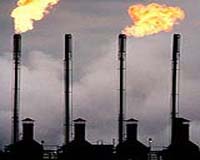 |
Baghdad (UPI) Dec 9, 2009 Amid a new terrorist bombing campaign that is likely to intensify as parliamentary elections loom, Iraq's beleaguered government is stepping up security around the Oil Ministry as it prepares to auction licenses to develop some of the world's richest oil fields. The auction is scheduled to be held Friday and Saturday with major international oil companies lined up to bid for 10 largely untapped oil fields whose development could save the strife-torn country from ruin after decades of tyranny, war and sanctions. Senior executives of the majors are expected to attend despite that latest carnage Tuesday, when 127 people were killed in a series of five bombings in Baghdad. None of the bombs exploded near the Oil Ministry, where the auction is scheduled to be held. But the attacks, and the expectations that violence will escalate in advance of the elections now set for March 7, were a grim reminder to foreign oil companies that they will be operating in a highly volatile environment. Abdul Mahdy al-Ameedi, deputy director of the Oil Ministry's Petroleum Contracts and Licensing Directorate, said the ministry will be sealed off during the auction. "The area will be protected by air and land surveillance," he said. For the Iraqis, much is riding on the auction, the second sell-off of development licenses. The first was held in June, but differences between the Oil Ministry and the foreign companies over financial issues resulted in only one consortium securing a contract. But those differences have been ironed out, with the companies accepting a lower price per barrel produced in return for tax concessions and other sweeteners. So far, four major consortiums have secured agreements or are expected to do so soon. This week's auction is expected to produce a new crop of agreements under which the oil companies will invest billions of dollars to upgrade Iraq's badly rundown oil industry. The government is depending on this to boost production from the current level of around 2.5 million barrels a day to as much as 10 million to 12 million in the next six or seven years. Iraq's economic future hinges on this. Eighty-five percent of government revenue comes from oil exports. Some oil industry figures believe that the target of 10 million to 12 million barrels, which would rival Saudi Arabia's output of 12.5 million barrels a day and Russia's 10 million, may be too ambitious. Thamir Ghadhban, a former Iraqi oil minister and currently adviser to Prime Minister Nouri al-Maliki, told a London conference Monday that some oil companies have grossly overestimated the level to which they can hike production. He said that 6 million barrels a day was more realistic over the next six or seven years. "According to our plan, an oil production rate of 4.1 million barrels per day will be achieved by 2012, and this will be ramped up to 6 million by 2017," he said. Still, the oil fields that have been allocated to foreign companies and those that will be on the block Friday and Saturday are all considered to be prime producers with vast reserves. A consortium of BP and the China National Petroleum Corp. has signed a 20-year contract for the Rumaila field in southern Iraq, one of the largest in the world with reserves estimated at 17.8 billion barrels. Exxon Mobil and Royal Dutch Shell have signed an initial contract to develop West Qurna with some 8.6 billion barrels. A consortium led by Italy's Eni and including Occidental of the United States has signed an initial agreement for Zubair, which has an estimated 4.1 billion barrels. These groups, along with Chevron of the United States, Total of France and others, will be bidding this week for what are known as "super-giant fields" such as Majnoun, Gharaf and Halfaya in southern Iraq, Badrah Mirjan and East Baghdad in the central sector, and the Eastern Fields, Qayara and Najmah in the north. From a security standpoint, the northern sector is the most dangerous for the oilmen. Al-Qaida and other insurgents are most active there, while Kurds and Arabs are feuding over territory in what is widely seen as the next big battleground in a country riven by deep-rooted sectarian rivalries. Share This Article With Planet Earth
Related Links Powering The World in the 21st Century at Energy-Daily.com
 Energy demand to rise 35 percent by 2030
Energy demand to rise 35 percent by 2030Irving, Texas (UPI) Dec 9, 2009 Rising energy demand over the coming two decades will require investment in all potential sources of energy, Exxon Mobil said Tuesday in its latest report. The report, "New Outlook for Energy: A View to 2030," predicted energy demand would be about 35 percent higher in 2030 than it was in 2005, and meeting that demand will require "trillions of dollars of investment and a commitment to ... read more |
|
| The content herein, unless otherwise known to be public domain, are Copyright 1995-2009 - SpaceDaily. AFP and UPI Wire Stories are copyright Agence France-Presse and United Press International. ESA Portal Reports are copyright European Space Agency. All NASA sourced material is public domain. Additional copyrights may apply in whole or part to other bona fide parties. Advertising does not imply endorsement,agreement or approval of any opinions, statements or information provided by SpaceDaily on any Web page published or hosted by SpaceDaily. Privacy Statement |